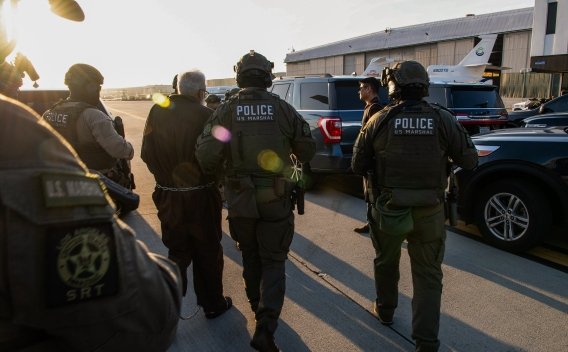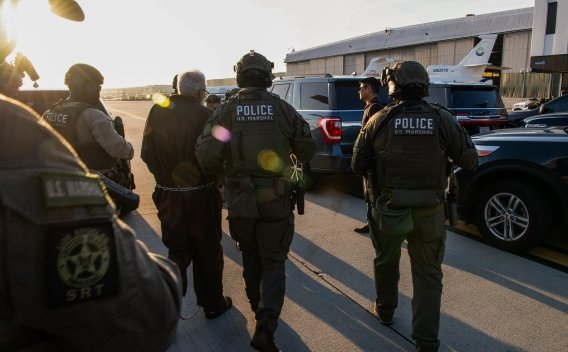Breaking: Tahawwur Rana Extradited to India—U.S. Marshals Hand Over Custody in High-Profile Transfer!
On April 11, 2025, breaking news emerged as the U.S. Marshals released images of Tahawwur Rana being extradited to India. This significant event marks a critical step in international law enforcement cooperation. Rana, a key figure in various criminal investigations, was transferred from U.S. custody in California to Indian authorities. The photo, captured by Shane T. McCoy of the U.S. Marshals Service, illustrates the formal process of extradition. The transfer underscores the ongoing commitment to justice and accountability for serious offenses. Stay updated on this story for further developments in international legal proceedings and implications for security.

Breaking: US releases pics of Tahawwur Rana being extradited to India. U.S. Marshals in the Central District of California transferring his custody to the Indian side.
Pc: U.S. Marshals Service photo by Shane T. McCoy pic.twitter.com/9c4vql5KkY
— Sidhant Sibal (@sidhant) April 11, 2025
Breaking: US Releases Pics of Tahawwur Rana Being Extradited to India
In a significant move that has captured international attention, the United States has released images showing the extradition of Tahawwur Rana to India. This event marks a pivotal moment in international law enforcement collaboration. The extradition process involves U.S. Marshals in the Central District of California transferring Rana’s custody to Indian authorities. Such actions highlight the ongoing efforts to address transnational crime and ensure that justice is served across borders.
U.S. Marshals in the Central District of California
The role of the U.S. Marshals Service is crucial in this extradition. They have been at the forefront of enforcing federal laws and managing the custody of individuals wanted by other nations. The images released show the professionalism and diligence of U.S. Marshals during this transfer. Their commitment to upholding the law while facilitating international requests for extradition is commendable. The [U.S. Marshals Service](https://www.usmarshals.gov/) has a long history of international cooperation, and this case adds to their legacy.
Transferring Custody to the Indian Side
As Rana is handed over to Indian authorities, it is essential to understand the implications of this transfer. Rana has faced serious allegations, and his extradition is seen as a step towards accountability. The Indian legal system is now set to take the lead in prosecuting him for his alleged crimes. This transfer not only signifies the commitment of both nations to fight crime but also serves as a reminder of the complexities involved in extradition processes. The interaction between U.S. and Indian officials showcases the collaborative spirit necessary for tackling international criminal activities.
Photo Credit: U.S. Marshals Service Photo by Shane T. McCoy
The images shared by the U.S. Marshals Service, captured by Shane T. McCoy, emphasize the seriousness of the situation. Visual documentation of such events plays a crucial role in informing the public and maintaining transparency in government actions. These photos not only provide insight into the extradition process but also humanize the individuals involved, reminding us that behind every headline, there are real people and real consequences.
The Broader Context of Extradition
Extradition cases like that of Tahawwur Rana are part of a larger framework of international law that seeks to ensure that individuals cannot evade justice by crossing borders. The cooperation between the U.S. and India demonstrates a mutual understanding of the importance of addressing issues related to terrorism and criminal activities. By working together, nations can strengthen their legal systems and enhance security for their citizens. The importance of international collaboration cannot be overstated, especially in an era where crime knows no borders.
Implications for Future Cases
As we reflect on the extradition of Tahawwur Rana, it is clear that this case may set a precedent for future extraditions between the U.S. and India. It signals a commitment to addressing transnational crime and reinforces the notion that legal accountability is paramount, no matter where one tries to hide. The ongoing dialogue between the two nations will likely evolve, paving the way for more streamlined processes in handling such sensitive matters. In a world where crime and justice intersect globally, the actions taken today will resonate for years to come.
